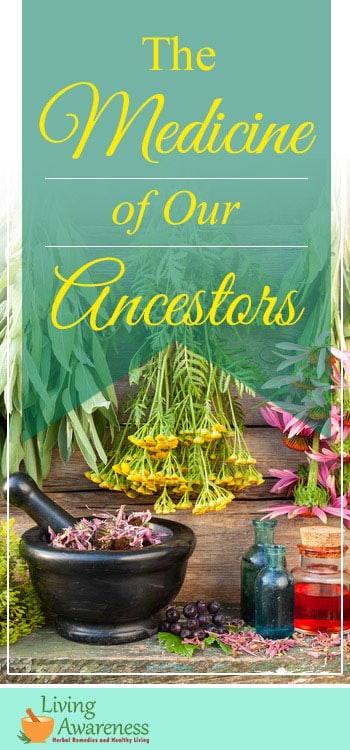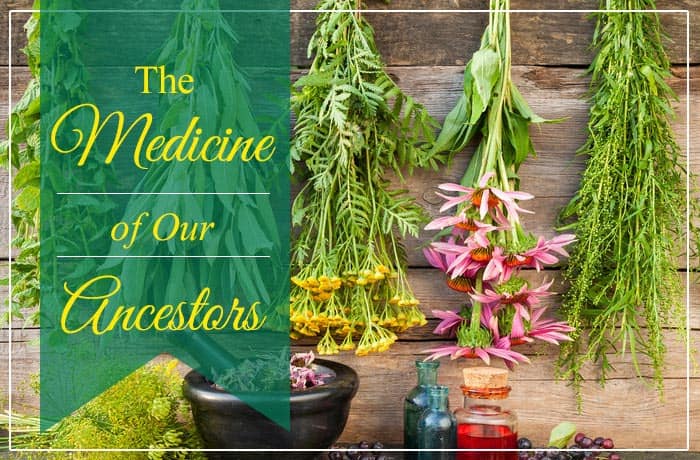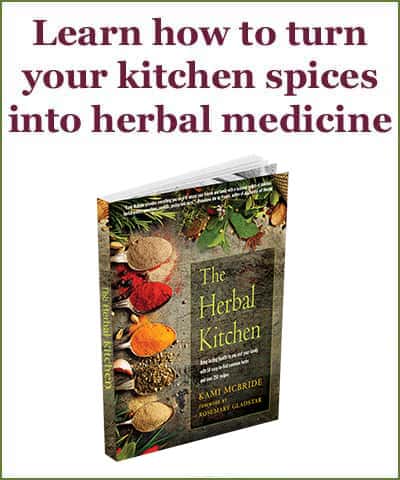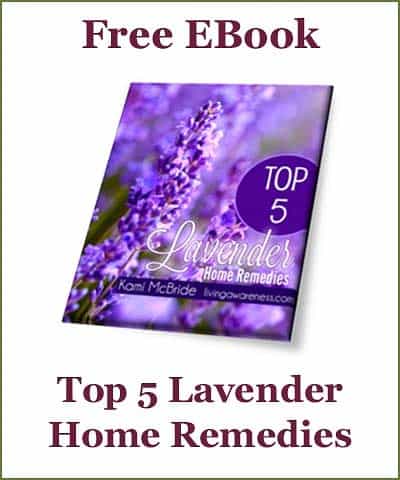Do you know any of the herbal remedies that were used by your mother, grandmother, great grandparents and aunties? Can you remember an ‘Old Wives Tale’ or a silly remedy that your mom always made you take when you started to get a cough?
“Our foremothers worked hard and if they took the time to make a remedy again and again it is because it worked.”
With the current anti-biotic resistance to bacteria and anti-biotic resistance to very strong strains of staph infections, these old remedies become instantly relevant to what we need to support our health and wellness.
One of my students is a Medical Doctor in a Northern California hospital. She said that five years ago when there was a staph out-break they would isolate the infected patients in one area of the hospital. She said now they don’t even bother. The infections are so rampant, that it is very common for someone to be staying in the hospital for a routine knee, heart or gall bladder surgery and end up very sick from the infection they pick up in the hospital.
Currently patients have a 50% less chance of being effectively treated for a serious staph infection than they did in 1980.
Let’s just say, I think it’s a good idea to use our herbal wisdom to try to stay well and out of the hospital!
Even if you aren’t interested in studying herbal medicine or formally taking health classes, you can build a small repertoire of home remedies to help yourself and your loved ones stay healthy and ward off infections.
It may be as simple as putting a little effort into interviewing the elders in your life!
Ask any aunts, uncles, grandparents or friends of your parents if they remember any home remedies that your ancestors used. Very often they won’t remember right away, but if you put it out there that you are interested, usually at some point you will get a phone call.
I had been teaching herbal medicine for more than fifteen years before it dawned on one of my aunts that I might be interested in knowing that my great grandmother frequently made horehound cough drops for all the kids. Horehound cough drops take a fair amount of effort to make, so that story tells me that it was an effective remedy if she took the time to do it.
My other great grandmother, Lillie Belle McBride had six children and helped to take care of dozens of other neighbor kids and nieces and nephews. The story is that when one child let out a single cough, out came the onions and the whole house would smell of onions as she cooked them up. She would chop up several onions, put them in a little water and slow cook them into an onion syrup. Every child that walked through her door then had to drink the onion syrup; it helped to keep a cold from spreading through the pack of kids. She didn’t want to take care of a dozen sick kids so she relied on onions to keep everyone well!

Our foremothers worked hard and if they took the time to make a remedy again and again it is because it worked. Many of the remedies that our elders used are very old remedies that were passed down for many generations. These people didn’t go to school or read in books about their remedies. They used the remedies because they saw them applied in the household they grew up in and the empirical evidence of seeing it work made the remedy stick.
The problem is that a remedy that could have been successfully used within a family for hundreds of years can be lost in one generation.
A single generation of children not interested in the remedies of the household means that it is not passed on. That is the common story in the United States. The love affair with pharmaceuticals took the place of onion syrup and horehound cough drops.
If the home herbal remedies were dropped in your lineage, is there a thread that you can find to try and re-weave that fabric that once existed as central to the home environment?
A few years ago I had dinner at a friends’ house and their 92 year old grandmother was visiting from Idaho. At some point in the conversation the grandmother told a story about her mother being the town midwife in Eastern Europe in the late 1800’s. Well, most midwives at that time were also herbalists.
I asked her a few questions and she said, “Oh my mom knew all the herbs, people came to her for all kinds of things”. She proceeded to tell several miracle stories of how her mom saved lives with the weeds she picked. I listened with great joy to the story of her mothers’ remedies and how she used them. My friends had no idea that their great grandmother was an herbalist and a healer. I feel so blessed to have received that ancient healing knowledge from another time.
I had a student many years ago. She had a grandmother from Mexico that she hadn’t seen in more than ten years. I told her that she was lucky to have a living grandmother and to go and visit her. She took a trip to see her grandmother and told her that she was interested in using herbs for healing.
She had no idea that her grandmother knew about herbs. My student spent the next two weeks with her grandmother and great aunts harvesting wild herbs and learning how to make teas, herbal washes and syrups. Her grandmother was an herbalist and a healer and had learned the art from her mother.
You never know who the person is in your life that might be holding some ancient herbal wisdom. Start asking around. Ask your eldest family member or your oldest neighbor who they remember using herbal remedies…you may be surprised….
What home remedies have been used in your family traditions?
What healing remedies did your family rely upon before antibiotics and hospitals were available?






My take on a Finnish topical pain reliever.- I use cracker dried Amanita muscaria mushrooms 🍄 crushed in to coconut oil. Blend mushrooms and heat infused in water bath, minimum 24 hours. Longer better, I allow mushrooms to settle, chill till coconut oil hardens. Seperate the mushroom part from oil with a knife You can use the oil topically for pain. If you want a stiffer salve, add bees wax . I use 1 Oz to 3 or 4 cups of oil. Pour in to clean glass jars. I use liberally on husbands back pain, works better than narcotics… I… Read more »
This is great info, keep it coming. My mother would make my siblings and I swallow vicks at the onset of a cold!
I don’t know much about my ancestors let alone herbal remedies they used. I myself had a chronic sore throat growing up. Strep many times, and whooping cough twice with scarlet fever. I became very aware when a sore throat was coming on. I would immediately gargle with salt water and drink hot honey water to soothe it afterwards. My mother had no idea what I was doing until we went to the doctor, and I asked if the home gargling was helpful. He said yes, and suggested that I could also gargle with crushed aspirin water. My mother was… Read more »
Chamomile, my mom gave it to us as tea, no sugar, for colds and flu, and warm Chamomile tea bag on a sty in the eye.
My parents were from the backwoods of West Virginia. For sure my grandparents relied on all the skills a homesteader would need. They collected all the greens in spring, various roots (also to sell) in fall, had a big garden, collected nuts, raised livestock, hunted, had a root cellar and canned everything. My Mom remembers not having a fridge and storing food in a fast running spring and bathing in a tin tub in front of a coal stove. Sadly no actual remedies were passed to me except black walnut juice for warts and greens! I’ve been doing ancestry work… Read more »
Great story!
My mother used herbal tea for her gallbladder stones.
I use herbal tea like aniseed stars and seeds to calm my digestive system.
Liquorice for my liver etc.
As children when we had earache, our Mum would pluck a geranium leaf and put it on our ear. As well as warming salt in a pan and putting it in a brown paper bag, to lay our head on. Somehow it always worked a charm!
My grandmother lived to 102. Took cold showers, would ground/earth and wouldn’t eat anything from a can. She’d tell us if man produced it, it will kill you.. Her dad was an herbal pharmacist and unfortunately the only recipe I use to date is the calming tea which consists of 5 leaf jasmine, Tilo, Anise star, and honey. It calms the nerves as well as the stomach. Thank you for sparking back my interest in herbal remedies. I’ve moved to 4 acres and the abundant blessing of wild edible and healing plants is keeping me busy. Many wonderful blessing to… Read more »
As a child, mom & dad made skunk grease! It isn’t an herb but an old remedy from the stinker part of the skunk. We had to be about on our death bed to let them know we were sick!
From my ethnic background, my grandparents generation had often sought traditional herbs from their homeland to treat many ailments. Something as simple as coughs and sore throats, kumquats, a type of small tangerine, preserved in sea salt for a month are ready to use mix with hot water to make a soothing tea.
Thank you for sharing, Pei
When any of us had a barking cough, My Dad would mix whisky and honey together for us to take. It seemed to be the only thing that worked
My father has lots of stories of digging ginseng and goldenseal root in the Appalachian mountains, but he and his uncle did it for profit. In a way I feel indebted to these two plants to not use them, but plant them. I wish I had more positive stories of plants my ancestors used, but this is the only one and it is a saddening story.
Just think, as they sold them, someone else used them to get or stay healthy. They were doing a service, be proud of them!
i use to get warm apple brandy with honey when i had croop before i went in the croop tent when i was little.
My grandmother taught me that chewing on cabbage core cures stomach problems. She’s long gone. I wish I had asked her for more history and remedies. Thank you Kami, for your book and all the rest of your teachings. We are so fortunate to have these secrets brought to light. And thanks to all of you who comment and share. ❤️
My Grams always had us eat onions and garlic–I learned to enjoy them after a while. The other thing she did, was enforce us getting dirty–real dirty–it was okay to eat some dirt, not wash your hands after playing in the gardens, and allowed us to be outside exploring the woods behind the house. I later learned that by doing this, it builds up the immune system. I’m very fortunate I grew up like this because I don’t get sick, and neither do my kids (they were always outside getting dirty).
Thanks to Grams!
I keep chopped garlic and raw honey made up! Both are great infection fighters so we take it daily during flu season or if we get sores popping up. The garlic keeps mosquitos at bay too.
My great Grandmother was a herbal healer in Austria. My mother used so many remedies on herself, her 9 children and pets. I continue this practise. Mustard plasters were big in my house. A paste of mustard powder and water is spread on a cloth and placed cloth side down on the chest, away from the skin so as not to cause irritation. plastic wrap over that and a warm towel and/or a heating pad over that. Breaks up congestion in the lungs from chest colds and pneumonia. Also great for aches and pains. I had a lot of these… Read more »
My great grandmother also made the roasted onion liquid for coughs, she was from Scottland
Hi! I nearly forgot about this one…my grandfather from Croatia would make a rhubarb sauce every spring and eat it as a “spring cleanse”. It’s just the rhubarb stalks (no leaves as they are poisonous) cut into half or one inch pieces cooked on medium heat in a bit of water until soft and sauce-like.
He didn’t sweeten it but its really yummy with some raw honey added, although I don’t know if that would defeat the purpose of the cleanse.
My Choctaws ancestors used plants and roots for many of their medicinal needs. Roots were dug in the fall of the year when they were purer and most of the poison had gone out of them. They were steamed to the boiling point but were not allowed to boil hard. A medicine is said to have been named most often for the insect or animal which attends it. The following notes were obtained regarding specific remedies: Rabbit tobacco, also called by the whites “life everlasting”, was made into an infusion and drunk in cases of fever. It was also used… Read more »
Thanks so much for sharing this valuable information.
For plantars warts my Italian Grandma rubbed them with salt and then threw the salt where no one would go (the sewer). It WORKED!
My mother’s grandmother immigrated from Italy, made sure everyone ate dandelions each spring to ‘clean the blood’. She also used broad leaf plaintain (called it ‘5 veins’) for bee stings and boils. I did not know her but both traditions came down to me. While this one isn’t herbal still fun to mention – on my father’s side he learned how to ‘curse’ away a sty in your eye. His mother taught him and learned at least from her mother. Move a knife in circles in front of the eye and repeat a Slovenian chant 3 times, spitting after each… Read more »
I have heard of many Italian grandmothers teaching the dandelion spring clean!
Love this! My grandmother also went out collecting her “bitters” for salads in the spring time. I was listening to a Sharon Blackie lecture where she spoke about the chant/conjure being just as important as the plant, and also how individual families in a village would be known for a certain cure/ailment, so the knowledge of healing wasn’t centered on just one healer but became a communal enterprise. I would love to learn the Slovenian chant, if you’d care to share, as I’m researching my roots in that region.
Nettle tea for arthritis. It does work. A finger on my right hand started curling with arthritis. I’d been giving Greenleaf tablets to my animals for years and thought that I’d give it a go myself. Not being sure if the animal treatment was safe for humans I dried some nettles that I picked in my fields. Within a week I noticed that the curling had stopped (but not improved). When I had an extended trip away from home and forgot to pack my dried nettles I noticed that the curl started again. Back home and on the nettle again… Read more »
Hi Kami, I have very little ancestoral wisdom. I barely knew my grandmothers and they were not naturalists. I had to make my own way in the 1970’s but I had a sister-in-law who gave me s few very valuable tips. One was an anti arthritis and inflammation recipe to be drunk in the morning before any food. Hot water, whole organic lemon juiced, 2 tablespoons organic apple cider and raw organic honey. I am arthritis free at 71 years. Her next big tip was the uses of Colloidial silver solution for any mucosal infection in the eyes, ears, nose,… Read more »
My mother used to say the downfall of the planet will be when people do not know how to cook from what they foraging. She said she collected 42 herbs from where she grew up and now she can find about 12 of them. Times are changing and I think we’d all be wise to stay close to the earth for better health. Thanks Kami!
That is so sad to lose so many wild herbs! Where did she grow up?
Wish I knew what it was, probably don’t want to know…but my grandmother had a black salve she used to cure boils. It was bought at a store—at least until the 1960’s or so. We put it on, bandages the area overnight, and by morning the boil would have burst and the pus would be on the bandaged. This black salve was also used to draw out splinters etc.
I’ve bought what is labeled as black salve in tins, and other things called drawing salves, but nothing worked as well as the black salve my grandmother had.
Hi Sharon, I remember black salve. Here’s how you can make your own as good as your grandmothers. Black Salve Recipe. 3 Tablespoons comfrey, calendula and plantain infused olive oil (see instructions below) 2 teaspoons shea butter. 2 Tablespoons coconut oil. 2 Tablespoons Beeswax. 1 teaspoon Vitamin E oil. 2 Tablespoons Activated Charcoal Powder. 2 Tablespoons Kaolin Clay. 1 Tablespoon honey Warm the shea butter in a bowl set into a pan of hot water, heat over low flame until melted. Mix the charcoal powder and clay in liquid coconut oil until dissolved and then add to shea butter. Add… Read more »
Are the comfrey, calendula and plantain each seperate infusions. And is the plantain the kind that grows on my driveway. My grandmother bought her salve from the Watkin’s man when he came around but they don’t carry the drawing salve any more.
I make all of my infusions separately first. The plantain is plantago majorus
My father-in-law swore by boiling a large handful of green grass in water to make a tea for removing boils. My youngest brother had a boil on his inner thigh so I tried it (had to add some sugar before he’d drink it) He drank a cupful for two days in a row and on the third night it was gone.
What did it smell like? There is a great black salve that comes from Russia and other Baltic Sea country traditions. It’s made from cooking down the pitch from the pines. My friend gave me a bottle and specifically said it’s for splinters too so I thought that might be the one!
Great post! I love that we can share healing knowledge. I think in some families such things have been kept as family secrets for a variety of reasons. So let me share…. Well, maybe it’s not herbal but it’s a long standing tradition in my family is to gargle warm salt water for sore throats. I just did this recently and can attest this method always works for me! It cleans, disinfects and takes away the pain. My grandma used to put muster plasters on sick kids in the family. No one liked it but it sure worked for clearing… Read more »
Mustard plasters (dang auto correct!)
Hello. Where can I get this amazing book? I do live in Canada
Hi, Sorry for the confusion, this is a blog post, but you can get my book: The Herbal Kitchen right here: https://kamimcbride.com/theherbalkitchen/
I was taught herbal medicine by my father. Willow bark for headaches. This is just one. I treat our neighbors (dandelion sap for planters warts, calendula for healing) garlic and Mullein for ear drops….my kids use herbs too. I am hoping it doesn’t die out. I have a “cookbook” of my own for my remedies. Who will get it when I am gone???
oh Beth, i hope someone in your family picks it up!!!
Hi Beth. Perhaps you could post your remedies “cookbook” online. Then many people could benefit from your wisdom?
This is DEFINITELY not meant to be used but my grandmother rubbed kerosene over her aching joints. She lived to be 98 years old!
A friend of the family had a child who had warts all over her hand. She tied a string around her finger and kept it on for a week, then the patient was told to go throw it into the outhouse ! Another haha, but this one worked!!!
My dad used kerosene and mayapple for joint pain.
I too have heard of using kerosene for joint pain. My family is from SC.
Kami, I do not know of any healers in my ancestry, but I know there has to be some back there. My family, on both sides were farmers from the old country. So I know they knew and practiced herbalism. I am thankful to have come across Plant Allies and am fascinated to learn and have the plants teach me! Thank you for being a voice, and helping bring plant healing awareness to so many people!
You are so welcome Deborah, great that you are learning from the plants!
Hello Kami, do you have o book related to this subject?
Hmmm.. good question.. nope, just this blog. But i do talk a LOT about this kind of mind set in my course Herbal Kitchen Remedy Solutions….. https://herbalkitchenremedysolutions.com/protect-your-health
Kami, one of the first “natural” remedies I learned as a child was using dried corn silk to treat bladder infections. After shucking the corn from it’s husks, gather the silks (the string or hair like membranes that grow between the kernels). Dehydrate these and store in tightly sealed glass containers. When a bladder infection shows itself, brew a tea of 1/2 cup silk and 4 cups water. Allow to cool. Then drink 1/4 to 1/2 cup of the liquid 3 times daily. Within a couple of days the infection will be on the ruin. After 5 or so days… Read more »
My friend’s mother is El Salvadorian and we keeping meaning to get together so I can learn what she knows from home and from her mother and grandmother. This has motivated me to make the date with them. Also, I will say that two things I make regularly from your Cultivating The Herbal Medicine Woman From Within is chapstick and oxymel. I am never without a batch of oxymel. Even my son, who is now 8 1/2 (I was pregnant when I took your class) asks for it when he’s not feeling well. Still can’t get him to neti-pot, but… Read more »
thank you for the above article and i fully believe in the tradition of healing that has been passed down from our elders. More and more I find my friends relating back to what their mothers called “old wives tales”
thanks so much for the information that you send and I look forward to your next article…namaste
My daddy was one of the victims of the polio epidemic of the last century. My grandma used ARNICA to help heal Daddy. As a young girl, I was very bruise-prone. I knew that arnica would help, even though I didn’t know WHAT arnica was. Somewhere along the line, from my childhood to my early adulthood, arnica seemed to have disappeared. Over the years, I really wanted the arnica for my bumps and bruises. Imagine my surprise when I found that *I* could make my own arnica preparations! I have done this and do this now for myself and my… Read more »
If you look in the Mexican medicine section at Walmart, or in Mexican markets, they always sell arnica.